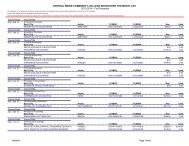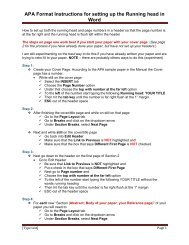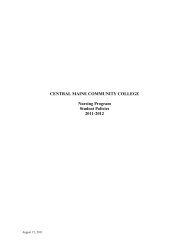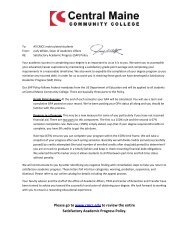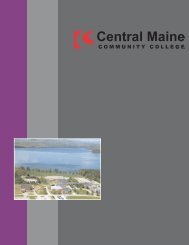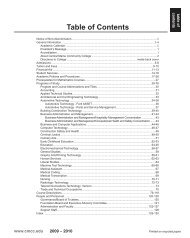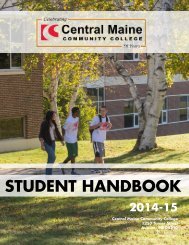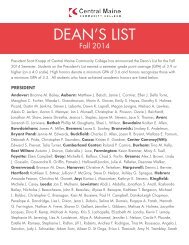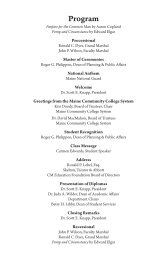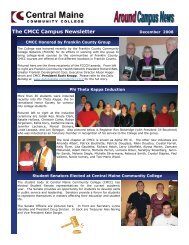Academic Policies and Procedures - Central Maine Community ...
Academic Policies and Procedures - Central Maine Community ...
Academic Policies and Procedures - Central Maine Community ...
Create successful ePaper yourself
Turn your PDF publications into a flip-book with our unique Google optimized e-Paper software.
<strong>Academic</strong> <strong>Policies</strong> <strong>and</strong> <strong>Procedures</strong><br />
policies <strong>and</strong><br />
procedures<br />
Distance Learning<br />
<strong>Central</strong> <strong>Maine</strong> <strong>Community</strong> College offers some<br />
courses for academic credit via the Internet.<br />
Students communicate with their instructors<br />
through electronic mail <strong>and</strong> receive their assignments<br />
through course materials posted on<br />
the Web. Some courses may require a textbook<br />
<strong>and</strong>/or materials on CD.<br />
Course Numbering<br />
CMCC has a group of specialized courses that<br />
may be activated by a department as the need<br />
arises:<br />
Special Topics: 294 This is a class that can<br />
change the topic within the department with<br />
each section. The topic will be a class that is not<br />
part of the normal inventory of classes.<br />
Independent Study: No unique course number.<br />
This is a class that is designed to be delivered<br />
independently of a formal classroom setting.<br />
There are really only 2 scenarios for this class,<br />
either it is an independent study for a class in<br />
our inventory or it is a special topics class taught<br />
in an independent study format. In both cases<br />
the course number of the class used in the<br />
classroom scenario is used, with a section number<br />
in the 80 series <strong>and</strong> the letters (IS) added to<br />
the course title. Any formal meetings will be in<br />
the instructor’s offi ce.<br />
Prior Learning: 199 See college catalog section<br />
under <strong>Academic</strong> Credit for Prior Learning<br />
for additional information.<br />
Practicum: 299 This is a college course, often<br />
in a specialized fi eld of study, which is designed<br />
to give students a supervised practical application<br />
of previously studied theory. If more than<br />
one practicum is allowed or required, then this<br />
should be repeatable with adjustments to the<br />
course title.<br />
Field Experience/Internship: 197 <strong>and</strong> 297 (depending<br />
on fi rst years vs. second year) Field<br />
Experience is application of knowledge <strong>and</strong><br />
analysis in professional settings. If more than<br />
one field experience is allowed or required, then<br />
this should be repeatable with adjustments to<br />
the course title.<br />
Capstone: 298 Capstone Experience is an<br />
activity for graduation students that is designed<br />
to demonstrate comprehensive learning in the<br />
major through some type of product or performance.<br />
Transcript of the Permanent<br />
<strong>Academic</strong> Record<br />
The permanent academic record is main tained<br />
by the Office of the Registrar for all students of<br />
the College. While the grade report is the official<br />
notification to the stu dent <strong>and</strong> the faculty advisor<br />
of the student’s academic achievements for<br />
a given semes ter, the only true <strong>and</strong> valid documentation<br />
of academic work <strong>and</strong> student status<br />
is an official transcript of the academic record,<br />
stamped with the Registrar’s signature <strong>and</strong> embossed<br />
with the seal of the College. The transcript<br />
is available only with the permis sion <strong>and</strong><br />
signature of the student, <strong>and</strong> will be released to<br />
that student or a designee only if there are no<br />
outst<strong>and</strong>ing charges against his or her account<br />
with the Busi ness Office. Transcript applications<br />
are available from the Registrar’s Office. The<br />
first 10 requests are free.<br />
<strong>Academic</strong> Conflict Resolution/<br />
Grievance <strong>Procedures</strong><br />
Whenever an academic question or differ ence<br />
arises between an instructor <strong>and</strong> a student, the<br />
following procedure will be followed:<br />
1. The student will discuss the issues with<br />
the instructor; if unresolved,<br />
2. The matter may be discussed with the<br />
Department Chair or Program Administrator;<br />
if still unresolved,<br />
3. The matter may be appealed to the Dean<br />
of <strong>Academic</strong> Affairs for a final decision.<br />
Appeal procedures have also been developed<br />
for resolving conflicts relating to affirmative<br />
action <strong>and</strong> discipline matters.<br />
Final Grade Appeals<br />
In accordance with the MCCS Policy 309, Student<br />
Grade Appeals <strong>and</strong> <strong>Academic</strong> Misconduct,<br />
the following procedure shall take place for final<br />
grade appeals. There is a basic assumption<br />
that the student will converse with the instructor<br />
to determine the contributing factors that<br />
determined the final grade. If the student is not<br />
satisfied with the result of the a conversation,<br />
the student may then file a formal appeal.<br />
A formal appeal must be submitted in writing<br />
within 30 days of the posted grade. Such an<br />
appeal must state mitigating circumstances that<br />
are supported by documentation <strong>and</strong> also state<br />
the resolution that is sought.<br />
Mitigating circumstances are objective in nature.<br />
Under most circumstances, disagreements over<br />
the quality of work or instructor competence are<br />
considered subjective <strong>and</strong> are not subject to<br />
appeal. A student must establish that the fi nal<br />
grade was:<br />
• Based on arbitrary or personal reasons<br />
unrelated to the instructors judgment of the<br />
academic performance of the student <strong>and</strong>/<br />
or<br />
• Grade was assigned not in accordance<br />
with the course syllabus or related adjustments<br />
of the syllabus that may have occurred<br />
during the semester <strong>and</strong>/or<br />
• There was an error in calculating or recording<br />
of the grade<br />
Documentation might include test results that<br />
were not used in grade computation. Such evidence<br />
must be attached to the appeal. Falsifi -<br />
cation or fabrication of information provided by<br />
the student may be subject to disciplinary action<br />
under <strong>Academic</strong> Misconduct of MCCS Policy<br />
309.<br />
Resolution may be a request to recalculate the<br />
final grade based on the evidence provided.<br />
1. The appeal will first be submitted to the<br />
department chair offering the course if still<br />
unresolved,<br />
2. The appeal will then be submitted to the<br />
<strong>Academic</strong> Dean whose decision is final.<br />
Note: This policy applies only to fi nal grades.<br />
However, course grades which result from alleged<br />
violation of the student code of conduct/<br />
academic misconduct can not be appealed<br />
under this policy. There are separate policies<br />
<strong>and</strong> procedures that take precedence in those<br />
situations.<br />
Disability Services<br />
<strong>Central</strong> <strong>Maine</strong> <strong>Community</strong> College is committed<br />
to providing the means to enable equal access<br />
to education for students with disabilities. Pursuant<br />
to federal law (Section 504 of the Rehabilitation<br />
Act of 1973, the Americans with Disabilities<br />
Act of 1990, <strong>and</strong> Americans with Disabilities Act<br />
Amendment Act of 2008) individuals with disabilities<br />
(those defined as having “a physical or<br />
mental impairment that substantially limits one<br />
or more of the major life activities of such individual,<br />
a record of such impairment, or being regarded<br />
as having such an impairment”) who are<br />
www.cmcc.edu 2010 ~ 2011 19



